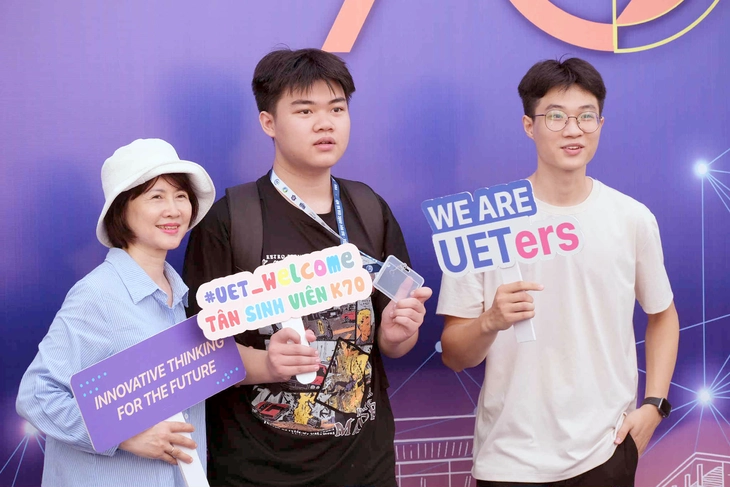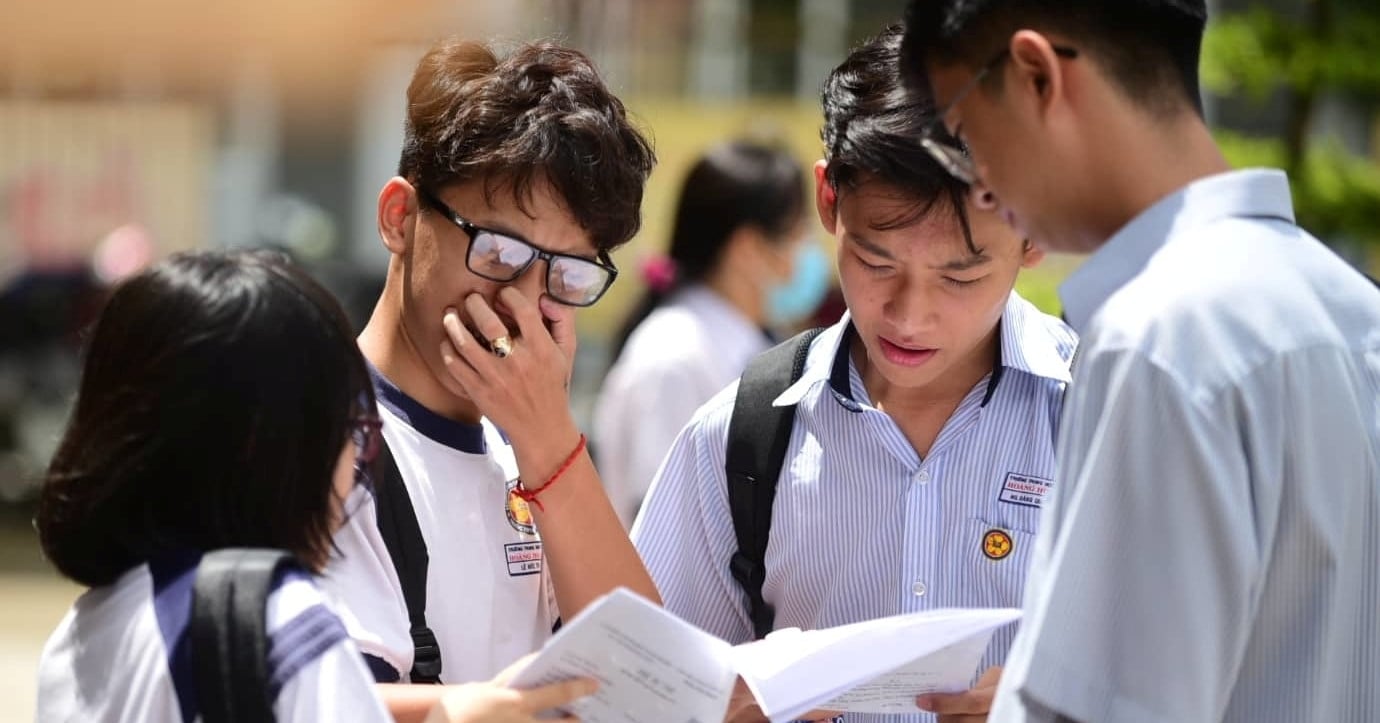
Candidates learn about university admissions at the 2025 University and College Admissions Choice Festival - Photo: THANH HIEP
This year, although the high school graduation exam scores decreased sharply compared to last year, the university admission scores increased to a record high. There were even six majors with an absolute admission score of 30/30 and about a dozen majors with candidates scoring nearly 10 points per subject but still could not be admitted without priority points and bonus points.
Education experts point out many reasons such as unreasonable conversion of equivalent scores, multiple recruitment methods, too many bonus points...
Tighten regional priorities, loosen incentive points
Most noteworthy is the bonus points given by universities. Candidates who are excellent national students, science and technology competitions, excellent provincial students, students who won the 30-4 Olympic prize... will be awarded from 1 to 3 points.
According to the admission regulations, universities are allowed to add bonus points but not exceeding 10% of the maximum score of the admission scale (3 points/30-point scale). So some schools allow candidates to choose the highest bonus point, some schools allow candidates to use many different bonus points as long as it does not exceed 3 points.
A candidate with 27 points achieved a standard score of 30 because of 3 bonus points. That's why the whole country doesn't have any candidate who achieved 30 points in math - literature - English, but many majors recruiting this combination have a standard score of 30.
Not only that, many schools also allow candidates with international language certificates to convert into foreign language subject scores in the combination. The conversion score varies from school to school, but commonly 6.5 IELTS is converted into 9.5 English points when considering admission, from 7.0 is converted into 10 points.
That is why there is a story about a candidate who only got 6 points in the high school graduation exam in English, but thanks to the IELTS certificate, when applying for university, his English score was 10 points, a difference of 4 points. Among the 850,000 candidates applying for university admission this year, the number of candidates who are excellent students and have IELTS certificates is a minority but they are given special privileges many times over, while the majority of the remaining candidates are disadvantaged.
unfair
The practice of adding incentive points and converting points is applied by most universities, leading to low exam scores but the benchmark scores still increase rapidly, breaking previous benchmark records. Looking at the numbers, it can be seen that this is a good sign when the university recruits good candidates.
But behind that is huge inequality and unfairness, going against the objective and fair principles of admission.
A candidate with 27 points in the high school graduation exam passed the major with a standard score of 30 because of 3 bonus points, while a candidate with 29 points but no bonus points failed. The general education program is accessible to all candidates, although the learning environment, facilities, and teachers are different in each place. However, not all candidates have the conditions to study and take international language certificates, especially candidates in remote areas.
The Ministry of Education and Training has repeatedly emphasized fair competition among candidates and has issued many specific policies to implement this. Notably, the reduction of regional priority points - which is a lever for candidates from remote areas and disadvantaged areas - to compete with students in the city, where learning conditions are much better.
What can we see from the two stories: tightening regional priority points for students in remote areas (accounting for the majority of candidates) and allowing bonus points for a minority of excellent students with IELTS (students' families have good economic conditions and good learning conditions)? Is the admission fair?
It is easy to see that less fortunate candidates are disadvantaged in every way. All they have is their academic ability, their only competitive weapons are their determination and their high school graduation exam scores. A few regional priority points are also increasingly being tightened. The better they study and the higher their exam scores, the less priority points they have.
On the other hand, many candidates have the opportunity to study more, study and take the IELTS exam to get a certificate. The graduation exam score is not high, they can use the IELTS certificate to get extra points, sometimes up to 3 points, or convert it into a 9 or 10 score in English when applying. The IELTS exam this time is low, candidates can review and retake the exam until they get the desired score, but the high school graduation exam is only taken once. It is clear who has the advantage.
Thus, it can be seen that there is inequality and unfairness right from the admission policy, not to mention the reality. Of course, candidates also have to study and review hard to get IELTS scores, it does not fall from the sky. They also have to have a certain learning ability to achieve the standard score, regardless of the bonus points or conversion.
Here we do not discriminate against IELTS test takers and certificate holders. What we want to say is that fairness is reflected in the admission regulations. That fairness is reflected in specific regulations, formulas and scales. And when fairness is stipulated, the implementation must also be in accordance with that spirit, ensuring that all candidates have equal opportunities to compete, not affected by factors other than their academic ability.
Adding 3, 2, 1 regional priority points for candidates in remote areas was previously considered unfair and has been reduced to 1/2. There are even technical barriers so that the higher the score, the lower the priority points. Adding 3, 2, 1 points for excellent candidates with IELTS certificates is now legalized in the regulations and does not have any technical barriers, the school can add as much as they want.
If there is inequality in legal documents, it is difficult to demand fairness in reality.
Tighten regional priority points
Before 2018, each priority area was 1 point apart. Candidates in area 1 were awarded 3 points, rural area 2 were awarded 2 points, and area 2 was awarded 1 point. This point-adding practice has been in place for more than 10 years.
However, many opinions say that adding too many regional priority points is unfair for students in the city. In 2018, the ministry reduced the regional priority points by half, corresponding to 1.5, 1 and 0.5 points.
By 2023, the priority points (including priority for subjects and regions) will be tightened again. Accordingly, candidates with 22.5 points or more will not enjoy their full priority points but will be calculated according to a decreasing formula. The higher the test score, the lower the priority points and up to 30 points, they will no longer enjoy any priority points.
A school has nearly 200 candidates achieving perfect scores thanks to "bonus points"

New students enrolling at the University of Technology, Vietnam National University, Hanoi on the morning of August 24 - Photo: NGUYEN BAO
On August 24, the University of Engineering and Technology, Vietnam National University, Hanoi organized direct admission for more than 4,200 new students admitted to the school. In the morning alone, nearly 3,000 candidates completed admission procedures.
According to statistics from the school, 192 candidates were admitted to the school with a perfect score of 30; 815 candidates scored from 28-29 points; 1,239 candidates scored from 27-28 points. The percentage of candidates scoring 29 points or more accounts for 13% of the total target.
In particular, the computer science industry has 128 candidates scoring 29 points or more, accounting for 29% of the total target of the industry; information technology has 213 candidates, accounting for 48% of the target of the industry.
The above score includes converted points and bonus points.
Previously, the University of Technology announced the standard score ranging from 22.14 to 28.19 points, with the highest being information technology; the lowest being agricultural technology. Most majors have a standard score above 26.
Professor Dr. Chu Duc Trinh - Principal of the University of Technology - said that this year the school has especially increased its quota in majors in the fields of information technology, artificial intelligence, electronics, semiconductors and automation, but the attraction to the school has not decreased but has increased the benchmark score.
Source: https://tuoitre.vn/diem-chuan-va-su-thieu-cong-bang-20250824234357016.htm








![[Photo] General Secretary To Lam attends the 80th anniversary of Vietnam's diplomacy](https://vstatic.vietnam.vn/vietnam/resource/IMAGE/2025/8/25/3dc715efdbf74937b6fe8072bac5cb30)







































































































Comment (0)